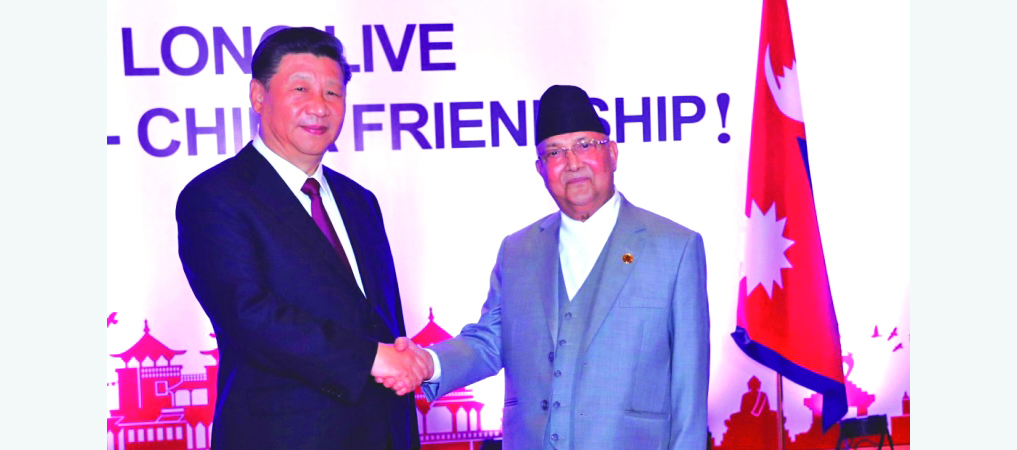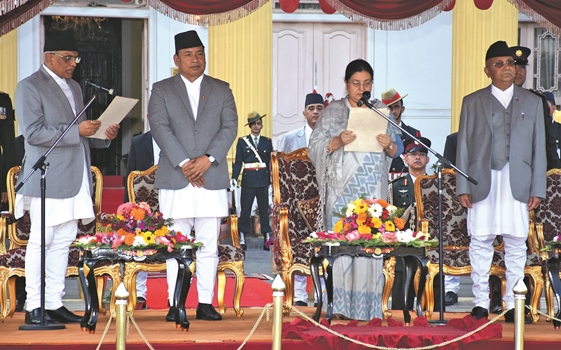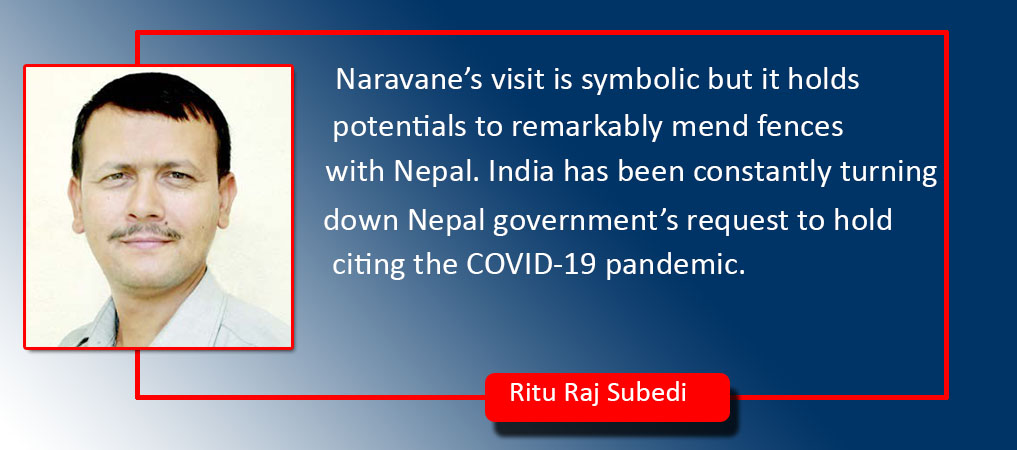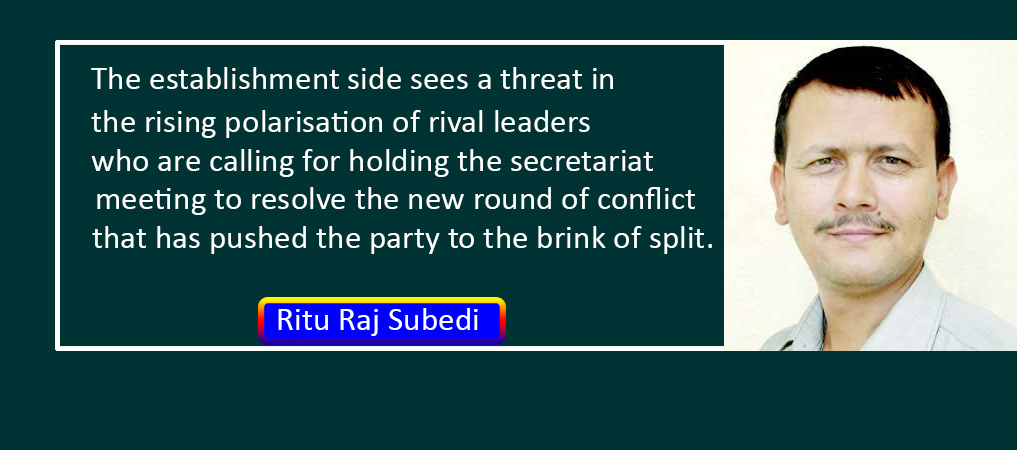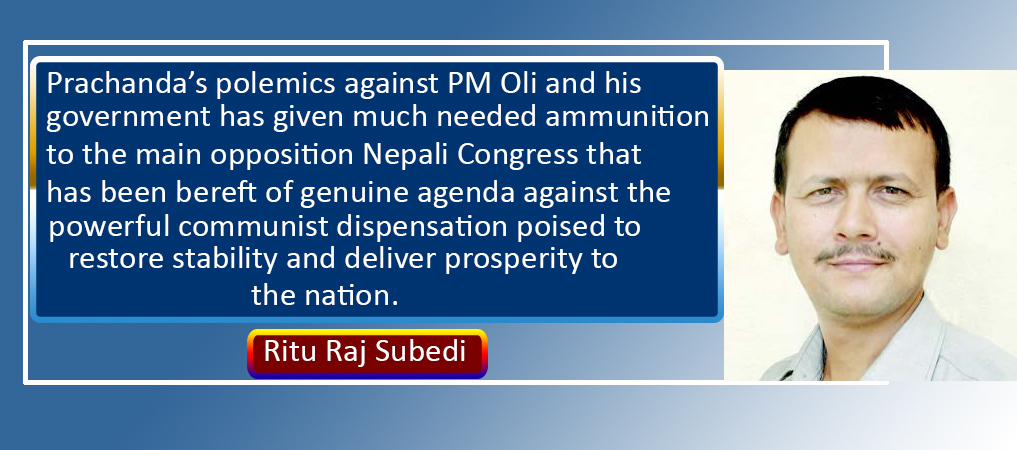Integrated Foreign Policy Can It Stop Foreign Meddling?

Ritu Raj Subedi
Located between the two giant neighbours, Nepal has always been sensitive about adopting the correct and practical foreign policy for three reasons – to safeguard her territorial integrity, national sovereignty and ensure sustainable survival of her population. Nepal’s founding father Prithvi Narayan Shah’s Dibya Updesh can be cited as the first authentic document that presents coherent social, cultural, economic, foreign, defence and trade policies that his newly created Nepali state should embrace for her consolidation, security, peace and development. Dibya Updesh has envisioned a robust economic nationalism and strong military arrangement to deal with potential internal chaos and external threat. His famous metaphoric saying – ‘Nepal is a yam between the two boulders’ – provides the country’s realistic geopolitical context, which continues to be a guiding foreign policy principle since the founding of the modern state of Nepal in 1769.
For more than a century, Nepal adopted an isolationist policy under the hereditary rule of Ranas. Suffocated by a lack of viable choice for the diversification of international relations, their relations were primarily confined to Britishers. With the country ushering in an era of multiparty democracy and open-up in 1951, she began to interact with a growing number of countries around the world, requiring her to devise and follow articulate foreign policies to promote national interest and muster international support for her development and prosperity. The country has pursued the principle of Panchsheel, the UN Charter, Non-Alignment, international law and the norms of world peace as the credible instruments to maintain cordial relations and cooperate with the neighbours, friendly nations and international community.
National interest
Directive Principles of Nepal’s Constitution promulgated in 2015 says: “The State shall direct its international relations towards enhancing the dignity of the nation in the world community by maintaining international relations based on sovereign equality while safeguarding the freedom, sovereignty, territorial integrity and independence and national interest of Nepal.” Rights of the Nepali people, border security, economic wellbeing and prosperity are other basic elements of the national interest which must be reflected in the foreign policy that is defined as the extension of the country’s internal policy.
As the foreign policy is directly related to the country’s independent existence, international image and foreign relations, it is a highly sensitive and important subject requiring greater diplomatic aptitude, morale and pragmatic skills in statecraft for its smooth and effective operation. Nepal’s foreign policy has been reviewed and revised with the regime changes and adoption of new political systems over the decades. The present government has formulated ‘Foreign Policy, 2077’ as an integrated policy by synthesising various diplomatic norms and practices embraced historically for attaining working uniformity, easiness and coordination in the execution of relations with the neighbours and other countries. It aims to conduct external relations in a more clear, coordinative and effective way.
Dubbed as the modest gain of the government, it reflects the aspirations and ambition of Nepalis in the 21st century. It has integrated the gist and ideas from different foreign policy documents and reports prepared by various task forces in the past. It has taken into account the emerging geopolitical changes having far-reaching implications for the nations bound to work and cooperate in the ever-growing interconnected, interdependent and globalised world. Guided by the motto of ‘amity with all, and enmity with none,’ it is tailored to realise the lofty goal of Prosperous Nepal, Happy Nepali. Among many other things, it has specified 13-point challenges and 15-point opportunity, shedding light on the nature, vision and strategy of the country’s foreign policy.
Challenges
The policy has seen challenges in protecting and promoting broader national interest in the fluid regional and global environment. Protecting Nepal’s international border is one such tough task, which demands a common approach to the execution of foreign relations through effective coordination, collaboration and cooperation from all sides. There are both good and bad precedents in this regard. The government, political parties, civil society and media had stood united while asserting Nepali territories – Lipulek, Kalapani and Lipmiyadhura – which have been encroached upon by India since the early 1960s. This is a good instance of handling the disputed issue by forging a common approach and national consensus.
Other challenges include strengthening multilateralism for wellbeing and security of the small and developing nations, soliciting the international support and assistance on the common concern and benefit of the countries like Nepal with the specific situation, increasing the competitive edge of LDCs, advancing the cause of mountainous nations about climate change, executing international relations to muster broader legitimacy and acceptability and muster external cooperation in the time of the global pandemic and big natural calamities. Equally, it is imperative to develop specific institutional capacity, human resources and professional skills to conduct foreign relations in the changing and competitive world environment.
Opportunities
The country has now clear constitutional guidelines with regard to the operation of foreign policy based on national consensus and unity. The policy states that the international community has goodwill towards Nepalis as tolerant, friendly, sincere, industrious and optimistic, and Nepal as peaceful, Loktantrik, inclusive and social justice-based state. Nepal has earned credibility and respect in the international realm owing to her independent, balanced, impartial and objective outlook as well as her contribution to the works of restoration of peace at the call of the United Nations.
“The possibility of gaining benefit from the rapid development of neighbours is getting strong in the context of consolidated relations and contact networks with them. Enabling policy, laws, structural bases and environment are in place for infrastructure development, export trade, foreign employment, technology transfer and foreign employment,” it says.
Split on geopolitical issues
However, Nepali political parties have, most of the times, been unable to pursue a uniform foreign policy to bolster nationalism and economic independence. They get divided over the particular foreign issues driven by geopolitical imperative. So the new policy has identified the difficulty in accepting and mobilising the international development assistance as per national priority and need while maintaining national leadership and ownership. Despite stressing the effective implementation of economic diplomacy, the country faces challenges in avoiding negative impact arising from the military rivalry between the regional and global powers upon Nepal’s sovereignty and national interest. The domestic consensus is a must for mitigating the undue foreign influences and interferences.
The parties have been split on a Millennium Challenge Corporation project funded by the US government. A large number of leaders and deputies within the ruling Nepal Communist Party (NCP) objected to an array of provisions of MCC Nepal Compact, which they insist undermine Nepal’s sovereignty and serve as vested geopolitical agenda against a neighbour. They sought revisions to the contested points but the US government has turned down their suggestions. But the government and opposition Nepali Congress are for endorsing it from the parliament. Thus, the MCC project has become a litmus test of not only political parties but also the foreign policy. Similarly, a sense of apathy towards the implementation of infrastructure projects under the Belt and Road Initiative (BRI) reveals the lack of political will and determination to push for the economic transformation of the country.
Soft power promotion
The new policy seeks to promote the country’s soft power through the propagation of Nepal’s enlightenment tradition, civilisational ethos, unique culture, language, tradition, costumes, and biodiversity. Nepal boasts as the birthplace of Gautam Buddha, an apostle of world’s peace, Sagarmatha (Mt Everest) and Pashupatinath, the most pious shrine of Hindus. These are the rare assets that the nation can promote to enhance her image and attract researchers, scientists, sages, tourists and investment for prosperity.
Internal unity is the key not only to robust economic development but also execute a creative foreign policy that elevates the nation’s political stability, prestige and progress. Nepal that succeeded to preserve her dignity and independence throughout history requires maintaining proactive neutrality, balanced and autonomous foreign policy in the spirit of the changes outlined in the constitution. Sad to say, she has again plunged into instability after the dissolution of the House of Representatives. With the division in the ruling Nepal Communist Party (NCP), the implementation of rosy points of new foreign policy has been now back-burner. Nonetheless, the document will guide the future government, policymakers, diplomats and scholars to defend the national interest and stand up to the foreign meddling.
(Deputy Executive Editor of The Rising Nepal, Subedi writes regularly on politics, foreign affairs and other contemporary issues. subedirituraj@yahoo.com)
Recent News

Do not make expressions casting dout on election: EC
14 Apr, 2022
CM Bhatta says may New Year 2079 BS inspire positive thinking
14 Apr, 2022
Three new cases, 44 recoveries in 24 hours
14 Apr, 2022
689 climbers of 84 teams so far acquire permits for climbing various peaks this spring season
14 Apr, 2022
How the rising cost of living crisis is impacting Nepal
14 Apr, 2022
US military confirms an interstellar meteor collided with Earth
14 Apr, 2022
Valneva Covid vaccine approved for use in UK
14 Apr, 2022
Chair Prachanda highlights need of unity among Maoist, Communist forces
14 Apr, 2022
Ranbir Kapoor and Alia Bhatt: Bollywood toasts star couple on wedding
14 Apr, 2022
President Bhandari confers decorations (Photo Feature)
14 Apr, 2022



